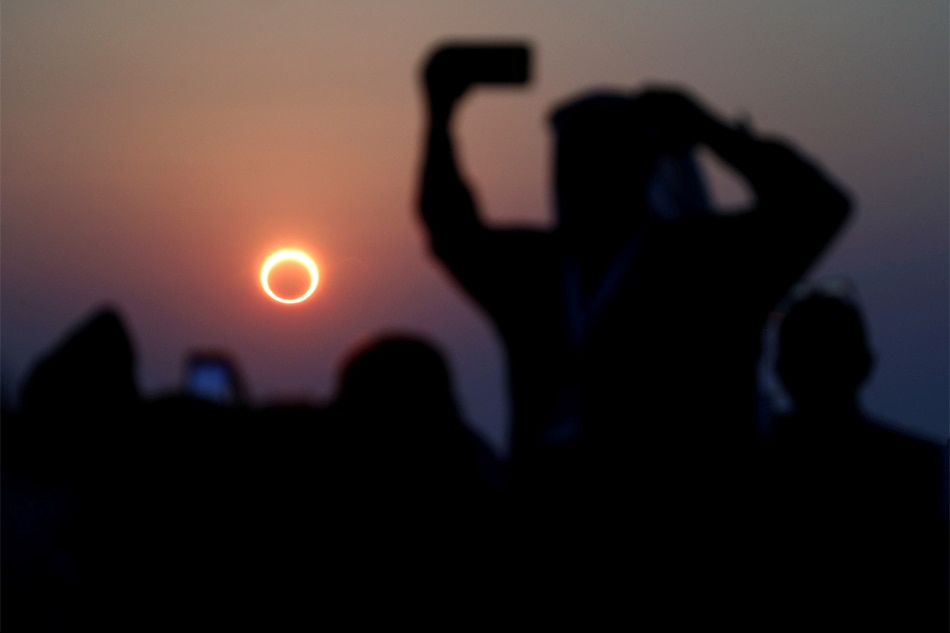'Ring of Fire' eclipse, summer solstice to fall on Father's Day | ABS-CBN
ADVERTISEMENT

Welcome, Kapamilya! We use cookies to improve your browsing experience. Continuing to use this site means you agree to our use of cookies. Tell me more!
'Ring of Fire' eclipse, summer solstice to fall on Father's Day
'Ring of Fire' eclipse, summer solstice to fall on Father's Day
Jamaine Punzalan,
ABS-CBN News
Published Jun 19, 2020 12:42 PM PHT
MANILA — Two astronomical events will fall on Father's Day, June 21: namely, the annular solar eclipse and summer solstice, the weather bureau said Friday.
MANILA — Two astronomical events will fall on Father's Day, June 21: namely, the annular solar eclipse and summer solstice, the weather bureau said Friday.
An annular solar eclipse occurs when the Moon is not close enough to the Earth to completely obscure the Sun, leaving a thin ring of the solar disc visible.
An annular solar eclipse occurs when the Moon is not close enough to the Earth to completely obscure the Sun, leaving a thin ring of the solar disc visible.
The eclipse can be viewed in any part of the country, but the "obscuration" or part of the sun covered by the Moon will be bigger farther up Luzon, PAGASA weather forecaster Ghela Lequiron said in a press conference.
The eclipse can be viewed in any part of the country, but the "obscuration" or part of the sun covered by the Moon will be bigger farther up Luzon, PAGASA weather forecaster Ghela Lequiron said in a press conference.
Itbayat, Batanes will have the biggest obscuration at 91 percent while Quezon City for instance will tally about 68 percent; Visayas, 52 to 66 percent; and Mindanao, 42 to 56 percent, she said.
Itbayat, Batanes will have the biggest obscuration at 91 percent while Quezon City for instance will tally about 68 percent; Visayas, 52 to 66 percent; and Mindanao, 42 to 56 percent, she said.
ADVERTISEMENT
The eclipse will run from 3 to 5:30 p.m., said Lequiron.
While these types of eclipses occur every year or 2, they are only visible from a narrow band of Earth each time and it can be decades before the same pattern is repeated.
The eclipse will run from 3 to 5:30 p.m., said Lequiron.
While these types of eclipses occur every year or 2, they are only visible from a narrow band of Earth each time and it can be decades before the same pattern is repeated.
Sunday's eclipse will be visible from a track that goes across Most of Africa, Southeast Europe, Asia and Micronesia. Viewed from neighboring Taiwan's Chiayi City, the eclipse will cover 97.5 percent of the sun for about 58 seconds, said Lequiron.
Sunday's eclipse will be visible from a track that goes across Most of Africa, Southeast Europe, Asia and Micronesia. Viewed from neighboring Taiwan's Chiayi City, the eclipse will cover 97.5 percent of the sun for about 58 seconds, said Lequiron.
An annular eclipse last Dec. 26, 2019 was observable only in the southernmost tip of the Philippines, while it appeared in the rest of the country as a partial eclipse.
An annular eclipse last Dec. 26, 2019 was observable only in the southernmost tip of the Philippines, while it appeared in the rest of the country as a partial eclipse.
The Philippines will have to wait for 43 years or until Feb. 28 2063 before it can observe another annular solar eclipse.
The Philippines will have to wait for 43 years or until Feb. 28 2063 before it can observe another annular solar eclipse.
The next partial solar eclipse that can be observed from the Philippines will happen on July 22, 2028.
Lequiron advised the public not to stare directly at the eclipse because this may damage the eyes, and instead use glasses, binoculars and telescopes with special solar filters.
Lequiron advised the public not to stare directly at the eclipse because this may damage the eyes, and instead use glasses, binoculars and telescopes with special solar filters.
The public may also view the eclipse through welder's goggles, water reflection or pinholes on a cardboard sheet or paper.
The public may also view the eclipse through welder's goggles, water reflection or pinholes on a cardboard sheet or paper.
Also on June 21, the Philippines will experience its shortest night and longest daytime during the summer solstice.
Also on June 21, the Philippines will experience its shortest night and longest daytime during the summer solstice.
A solstice is an astronomical event during which the sun is at its greatest northerly or southerly distance from the equator.
A solstice is an astronomical event during which the sun is at its greatest northerly or southerly distance from the equator.
— With a report from Agence France-Presse
ADVERTISEMENT
ADVERTISEMENT


